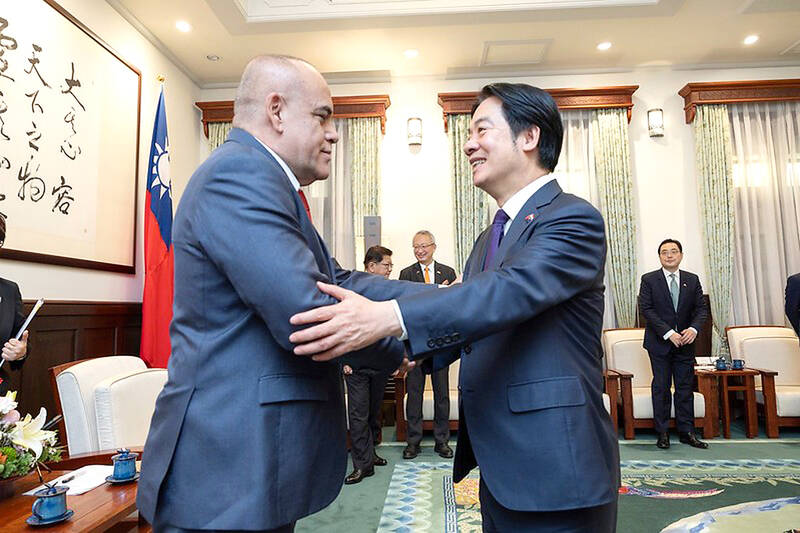President William Lai (賴清德) yesterday welcomed Paraguayan Senate President Basilio Gustavo Nunez Gimenez, who is visiting to bolster bilateral relations and deepen cooperation with Taiwan.
Nunez, who arrived with a delegation on Monday on a five-day visit, described Paraguay as “not only a friend, but also a partner,” and said his first trip to Taiwan after becoming Senate president in July was to reaffirm the South American nation’s commitment to bilateral ties.
Taiwan and Paraguay established formal relations in 1957. Paraguay is one of the 12 countries that diplomatically recognize Taiwan and Taiwan’s only ally in South America.

Photo: Screen grab from the Presidential Office’s Web site
At the meeting with Lai at the Presidential Office in Taipei, Nunez said Paraguay hoped to continue collaborating with Taiwan to bring prosperity to people from both countries and that the South American nation supports the right of countries to exercise freedom of navigation in the Taiwan Strait.
Paraguay also opposes any escalation of hostilities in the region, he said, while underscoring the importance of respecting the sovereignty of nations and upholding human rights.
Lai thanked Paraguayan President Santiago Pena and his government for supporting Taiwan’s bid to participate in the international community, most recently during the general debate of the UN General Assembly in late September.
Taiwan and Paraguay have achieved positive results from cooperation in areas such as education, healthcare, agriculture, infrastructure and women’s empowerment, Lai said, adding that his government looked forward to continuing working with Paraguay on mutually beneficial initiatives.
Also joining Nunez at the meeting were Paraguayan senators Derlis Hernan Maidana Zarza, Patrick Paul Kemper Thiede and Sergio Roberto Rojas Sosa, the Presidential Office said.
Separately, Taiwan and Paraguay have re- signed a Letter of Intent (LOI) to strengthen tourism cooperation, the Tourism Administration said in a statement issued yesterday.
The LOI was inked in Taipei on Monday by Tourism Administration Director-General Chou Yung-hui (周永暉) and his Paraguayan counterpart H.E. Angie Duarte de Mellilo, marking the first reconnection between the two sides on tourism matters since the COVID-19 pandemic, according to the Taiwan tourism agency.
Building on the framework set by the original LOI signed in 2018, Taiwan and Paraguay renewed the agreement, focusing on advancing digital, sustainable, and inclusive development in the tourism industry, the agency added.
The signing ceremony was witnessed by Paraguay’s Ambassador to the Republic of China (Taiwan), Carlos Fleitas.
Monday’s meeting was part of the itinerary for Duarte’s first trip to Taiwan. Her six-day visit, which began on Oct. 31, ended Tuesday.
During her time in Taiwan, she led a delegation of tourism officials to attend the 2024 Taipei International Travel Fair and visited the Sun Moon Lake National Scenic Area and National Taichung Theater, among other attractions.

A magnitude 7.0 earthquake struck off Yilan at 11:05pm yesterday, the Central Weather Administration (CWA) said. The epicenter was located at sea, about 32.3km east of Yilan County Hall, at a depth of 72.8km, CWA data showed There were no immediate reports of damage. The intensity of the quake, which gauges the actual effect of a seismic event, measured 4 in Yilan County area on Taiwan’s seven-tier intensity scale, the data showed. It measured 4 in other parts of eastern, northern and central Taiwan as well as Tainan, and 3 in Kaohsiung and Pingtung County, and 2 in Lienchiang and Penghu counties and 1

FOREIGN INTERFERENCE: Beijing would likely intensify public opinion warfare in next year’s local elections to prevent Lai from getting re-elected, the ‘Yomiuri Shimbun’ said Internal documents from a Chinese artificial intelligence (AI) company indicated that China has been using the technology to intervene in foreign elections, including propaganda targeting Taiwan’s local elections next year and presidential elections in 2028, a Japanese newspaper reported yesterday. The Institute of National Security of Vanderbilt University obtained nearly 400 pages of documents from GoLaxy, a company with ties to the Chinese government, and found evidence that it had apparently deployed sophisticated, AI-driven propaganda campaigns in Hong Kong and Taiwan to shape public opinion, the Yomiuri Shimbun reported. GoLaxy provides insights, situation analysis and public opinion-shaping technology by conducting network surveillance

‘POLITICAL GAME’: DPP lawmakers said the motion would not meet the legislative threshold needed, and accused the KMT and the TPP of trivializing the Constitution The Legislative Yuan yesterday approved a motion to initiate impeachment proceedings against President William Lai (賴清德), saying he had undermined Taiwan’s constitutional order and democracy. The motion was approved 61-50 by lawmakers from the main opposition Chinese Nationalist Party (KMT) and the smaller Taiwan People’s Party (TPP), who together hold a legislative majority. Under the motion, a roll call vote for impeachment would be held on May 19 next year, after various hearings are held and Lai is given the chance to defend himself. The move came after Lai on Monday last week did not promulgate an amendment passed by the legislature that

AFTERMATH: The Taipei City Government said it received 39 minor incident reports including gas leaks, water leaks and outages, and a damaged traffic signal A magnitude 7.0 earthquake struck off Taiwan’s northeastern coast late on Saturday, producing only two major aftershocks as of yesterday noon, the Central Weather Administration (CWA) said. The limited aftershocks contrast with last year’s major earthquake in Hualien County, as Saturday’s earthquake occurred at a greater depth in a subduction zone. Saturday’s earthquake struck at 11:05pm, with its hypocenter about 32.3km east of Yilan County Hall, at a depth of 72.8km. Shaking was felt in 17 administrative regions north of Tainan and in eastern Taiwan, reaching intensity level 4 on Taiwan’s seven-tier seismic scale, the CWA said. In Hualien, the